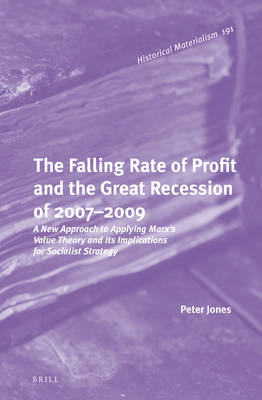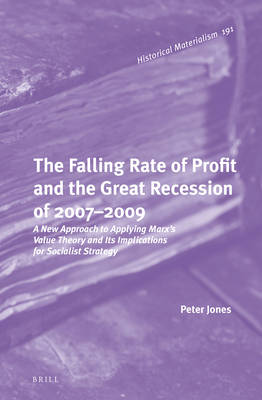
- Afhalen na 1 uur in een winkel met voorraad
- Gratis thuislevering in België vanaf € 30
- Ruim aanbod met 7 miljoen producten
- Afhalen na 1 uur in een winkel met voorraad
- Gratis thuislevering in België vanaf € 30
- Ruim aanbod met 7 miljoen producten
Zoeken
The Falling Rate of Profit and the Great Recession of 2007-2009
A New Approach to Applying Marx's Value Theory and Its Implications for Socialist Strategy
Peter H Jones
€ 253,45
+ 506 punten
Uitvoering
Omschrijving
In The Falling Rate of Profit and the Great Recession of 2007-2009, Peter H. Jones develops a new non-equilibrium interpretation of the labour theory of value Karl Marx builds in Capital. Applying this to US national accounting data, Jones shows that when measured correctly the profit rate falls in the lead up to the Great Recession, and for the main reason Marx identifies: the rising organic composition of capital.
Jones also details a new theory of finance, which shows how cycles in the profit rate relate to stock market booms and slumps, and movements in the interest rate. He discusses the implications of the analysis and Marx and Engels' work generally for a democratic socialist strategy.
Jones also details a new theory of finance, which shows how cycles in the profit rate relate to stock market booms and slumps, and movements in the interest rate. He discusses the implications of the analysis and Marx and Engels' work generally for a democratic socialist strategy.
Specificaties
Betrokkenen
- Auteur(s):
- Uitgeverij:
Inhoud
- Aantal bladzijden:
- 272
- Taal:
- Engels
- Reeks:
- Reeksnummer:
- nr. 191
Eigenschappen
- Productcode (EAN):
- 9789004325333
- Verschijningsdatum:
- 8/04/2021
- Uitvoering:
- Hardcover
- Formaat:
- Genaaid
- Afmetingen:
- 160 mm x 239 mm
- Gewicht:
- 544 g

Alleen bij Standaard Boekhandel
+ 506 punten op je klantenkaart van Standaard Boekhandel
Beoordelingen
We publiceren alleen reviews die voldoen aan de voorwaarden voor reviews. Bekijk onze voorwaarden voor reviews.











